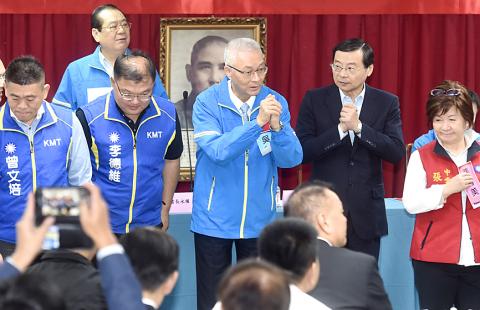Chinese Nationalist Party (KMT) Chairman Wu Den-yih (吳敦義) yesterday said that the party put together its legislator-at-large list in meticulous fashion and he was certain it would garner interest and approval, despite the discontent it has generated.
Wu made the remarks at the meeting of party representatives, who voted on the revised list passed by the party’s Central Standing Committee a day earlier.
The list has taken into consideration public expectations of the KMT and the political situation in Taiwan, Wu said.

Photo: Chien Jung-fong, Taipei Times
The list is a balance of functionality and representation for areas including education, sports, public sanitation and medicine, immigrant spouses, the high-tech industry, young people, labor rights, civil servants, military personnel and overseas compatriots, he said.
Wu asked party members to be understanding that the KMT might have passed over some people, but it could only “correct the wrongs” of the current administration if it wins at the ballot box in January.
All except one of the 34 candidates were approved yesterday, with the exception of former Mainland Affairs Council deputy minister Chang Hsien-yao (張顯耀), who received 19 “no” votes.
KMT Culture and Communications Committee deputy director-general Cheng Mei-hua (程美華) said that according to party regulations, everyone listed after Chang would move up one place, while Wu, as the party chairman, would nominate a member for the vacated 34th and lowest ranking.
Asked about the votes he received to be a legislator-at-large — 127 for and 58 against — Wu said that it was normal to receive some “no” votes.
The KMT would be an authoritarian party if he only got “yes” votes, he said.
Meanwhile, retired general Wu Sz-huai (吳斯懷) — who took fourth place on the list, despite criticism over his attendance at an event in Beijing in 2016 to celebrate the 150th anniversary of Sun Yat-sen’s (孫逸仙) birth and standing for the Chinese national anthem — yesterday said in his introduction at the meeting that he “pledges to defend the Republic of China [ROC] for the rest of his life.”
The ROC is “the one founded in 1911 by the KMT and not the ROC Taiwan that [President] Tsai Ing-wen (蔡英文) speaks of,” Wu Sz-huai said.

INVESTIGATION: The case is the latest instance of a DPP figure being implicated in an espionage network accused of allegedly leaking information to Chinese intelligence Democratic Progressive Party (DPP) member Ho Jen-chieh (何仁傑) was detained and held incommunicado yesterday on suspicion of spying for China during his tenure as assistant to then-minister of foreign affairs Joseph Wu (吳釗燮). The Taipei District Prosecutors’ Office said Ho was implicated during its investigation into alleged spying activities by former Presidential Office consultant Wu Shang-yu (吳尚雨). Prosecutors said there is reason to believe Ho breached the National Security Act (國家安全法) by leaking classified Ministry of Foreign Affairs information to Chinese intelligence. Following interrogation, prosecutors petitioned the Taipei District Court to detain Ho, citing concerns over potential collusion or tampering of evidence. The

Seventy percent of middle and elementary schools now conduct English classes entirely in English, the Ministry of Education said, as it encourages schools nationwide to adopt this practice Minister of Education (MOE) Cheng Ying-yao (鄭英耀) is scheduled to present a report on the government’s bilingual education policy to the Legislative Yuan’s Education and Culture Committee today. The report would outline strategies aimed at expanding access to education, reducing regional disparities and improving talent cultivation. Implementation of bilingual education policies has varied across local governments, occasionally drawing public criticism. For example, some schools have required teachers of non-English subjects to pass English proficiency

NEGOTIATIONS: The US response to the countermeasures and plans Taiwan presented has been positive, including boosting procurement and investment, the president said Taiwan is included in the first group for trade negotiations with the US, President William Lai (賴清德) said yesterday, as he seeks to shield Taiwanese exporters from a 32 percent tariff. In Washington, US Trade Representative Jamieson Greer said in an interview on Fox News on Thursday that he would speak to his Taiwanese and Israeli counterparts yesterday about tariffs after holding a long discussion with the Vietnamese earlier. US President Donald Trump on Wednesday postponed punishing levies on multiple trade partners, including Taiwan, for three months after trillions of US dollars were wiped off global markets. He has maintained a 10 percent

TRADE: The premier pledged safeguards on ‘Made in Taiwan’ labeling, anti-dumping measures and stricter export controls to strengthen its position in trade talks Products labeled “made in Taiwan” must be genuinely made in Taiwan, Premier Cho Jung-tai (卓榮泰) said yesterday, vowing to enforce strict safeguards against “origin laundering” and initiate anti-dumping investigations to prevent China dumping its products in Taiwan. Cho made the remarks in a discussion session with representatives from industries in Kaohsiung. In response to the US government’s recent announcement of “reciprocal” tariffs on its trading partners, President William Lai (賴清德) and Cho last week began a series of consultations with industry leaders nationwide to gather feedback and address concerns. Taiwanese and US officials held a videoconference on Friday evening to discuss the